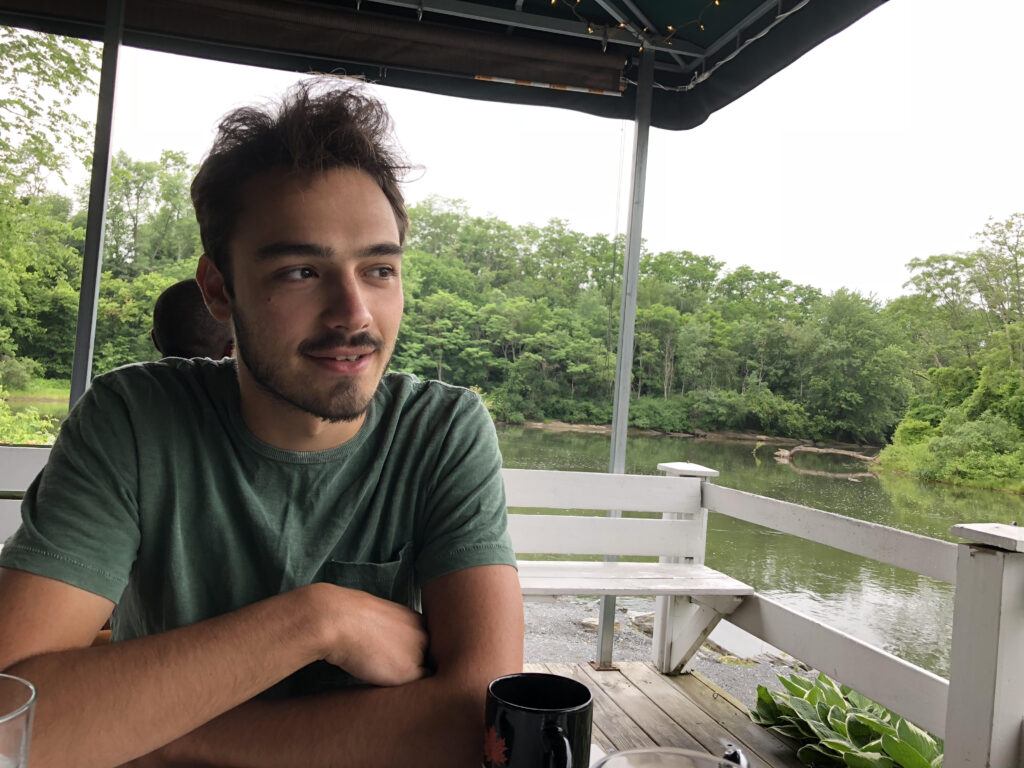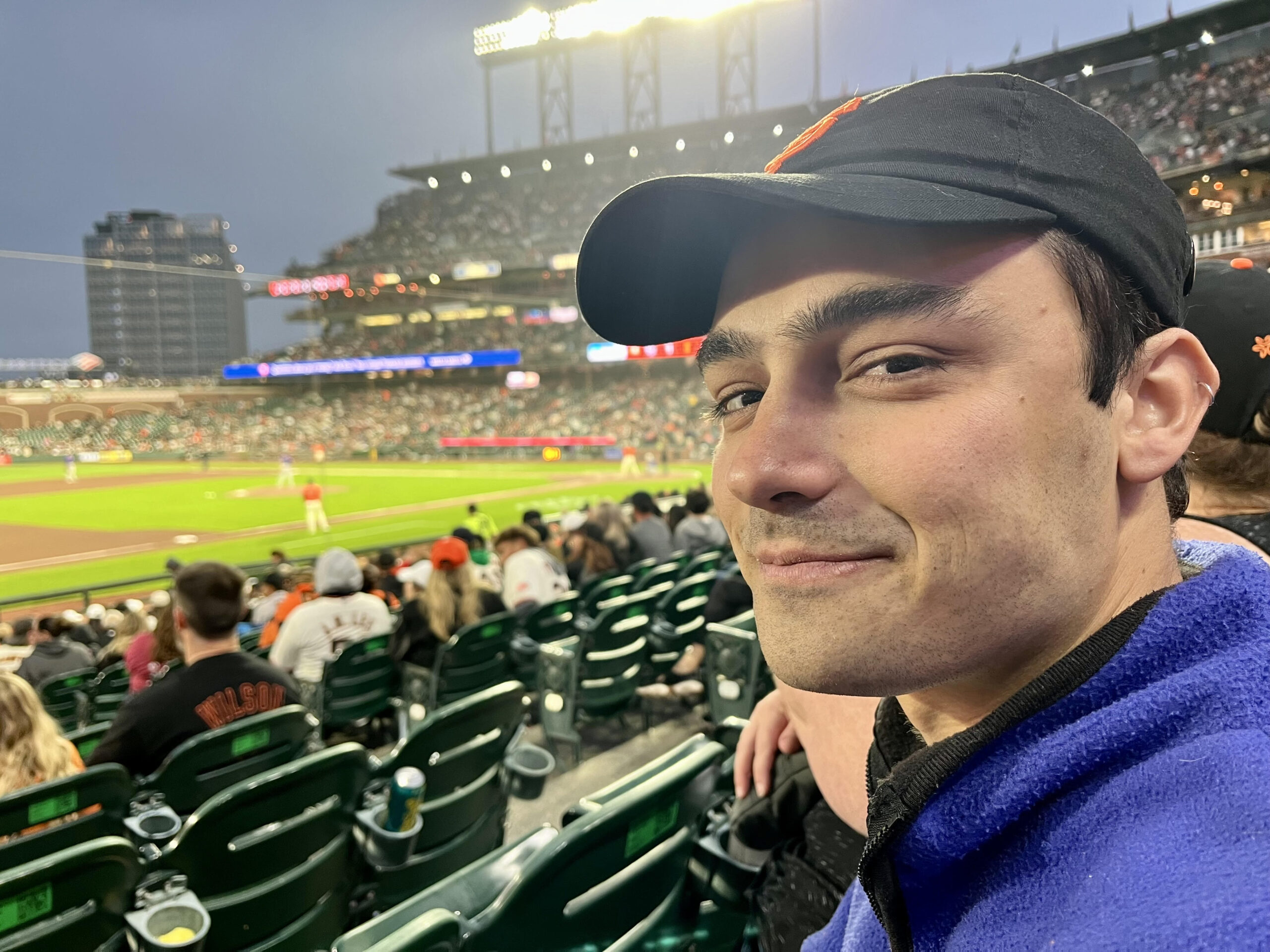Editorial intern Ali Shuaib ’25 talks with writer, editor, and former NER intern Chris Feeney ‘19.5 about asking for what you want, the future of AI language models, and his Middlebury memories.
Ali Shuaib: When did you graduate from Middlebury and what was your major?
Chris Feeney: I majored in English and American literature (creative writing focus), class of 2019.5.
AS: Where are you now, professionally and geographically?
CF: I’m living in Brooklyn and working as a writer and editor for an education nonprofit called Write the World.
AS: What were some steps that got you to where you are today?
CF: I think staying creative outside of work has helped me get to where I am today. While I’m lucky to exercise what you could call my “artistic education” at my job, it’s been vital to carve out time for my own creative projects. In my case, that’s mostly fiction writing, but I’m also interested in building computers and astronomy. Pretty disparate activities, but I guess the point is that those creative activities can be anything that makes you feel like an interesting, thoughtful, even exciting person. That sort of kind, healthy self-perception is a great motivator.
Otherwise, I’ve tried to keep in touch with as many people as I can and have found it immensely important to ask for something even if the likelihood of receiving said thing is low. Our artistic and professional pursuits take place both impersonally and online, and the “impersonal online” is a crowded, confusing place with probably too much material (job applications, manuscripts, and so on) for anyone to thoughtfully sift through. I ended up at my current job through a cold email. I’ve been able to submit stories directly to an editor. It’s not a foolproof strategy, but when I get the opportunity to talk to someone one-on-one, I try my best to take it.
AS: Are there skills you learned from interning with New England Review that still help you today?
CF: I think being involved with NER as a student helped me be more sincere as an editor and, specifically, as a reader whose opinion is being asked. In a writing workshop, it’s easy to fault or praise a work only because you feel required to say something. A friend of mine equates bringing a good story to a writing seminar to bringing a working car to an auto shop. They’ll always find something wrong with it, something to fix. I’m not convinced this is fair, but I enjoy the comparison. Reading with an expert editor like Carolyn is an immensely valuable learning opportunity.
So, working with NER taught me to be more steadfast when I said I liked what I was reading, and more reserved in my general feedback. I learned that it was irresponsible to give feedback I didn’t mean to a writer, because I had no idea what they would do with it. That realization has helped me as an educator, reader, and writer.
AS: You’re currently exploring how AI language models are changing the literary landscape, especially for younger writers. With this in mind, what advice would you give to emerging writers?
CF: Please keep working with a blank page! I’m glad I didn’t have access to generative AI as a Midd student because I probably would have abused it.
I think that creating something from nothing is a tremendous act that all writers need to be capable of— you don’t want that ability to atrophy with the proliferation of AI writing tools. Fortunately, I think creative writers still feel a sense of pride and ownership over their stories and (perhaps unfortunately) there is not some great financial incentive to have ChatGPT write a short story for you, so I’m not seeing much use in the creative writing community.
But this is all subject to change, so my advice would be to write your first drafts and then bring in genAI, if you want. In my writing, I use it for proofreading typos but not much else. If it begins suggesting stylistic line edits or any developmental edits, I try to rein in its ambition. You might also check out variations of what we typically think of as standard language models (ChatGPT, Claude, Bard, etc.). The organization I work with is developing an AI writing assistant that acts as a writing peer, engaging in a Socratic dialogue without writing any text for the user. Maybe this is a future for how writers can ethically use these tools; we certainly hope so.
AS: What inspires your own writing?
CF: Other writers and their stories are my biggest inspiration. Either writers I know personally whose early drafts I have the privilege of reading, or well-known authors whose work I’ve read time and again. Writing can feel oxymoronic in that it’s a solitary act that begs community, and I’ve found that I’m inspired less and less by personal experience. Maybe this means I lead a boring life, but I’m always offering to read someone else’s story because I know it will be good for my own work. Why limit yourself to your own imagination? Here I feel compelled to add that I’m not stealing ideas!
AS: What are some of your favorite memories from your time at Middlebury?

CF: I’m still close with many people I met during my first week at Midd, so those early interactions have ended up being favorite memories despite not being particularly interesting without that context.
Otherwise, I will always remember the milk truck crashing in the rotary outside Two Brothers Tavern during my first month at the school. There’s a great Addison Independent article available online that’s full of gems like “around 40,000 pounds of milk spilled from the tank, making its way along Main Street and into municipal storm drains located in front of the new municipal building and the Ben Franklin store,” which almost read like they were pulled from a Barthelme or Saunders story. I think this set the right tone for my college education—something about being observant and not taking yourself too seriously.
Of course, there are other more deeply appreciated memories from school—too many to list. It was a special time.
AS: Are you reading anything interesting at the moment?
CF: I’m currently reading The MANIAC by Benjamin Labatut, which gives a (heavily) stylized biography about the mathematician John von Neumann and the advent of computing and artificial intelligence. It’s an incredibly prescient book given what we’re dealing with today.
I’m also reading Bullshit Jobs: A Theory by David Graeber, which I highly recommend. It’s funny, profound, and you don’t have to dislike your job to enjoy the book, though I’m sure it’d be cathartic if you did.
